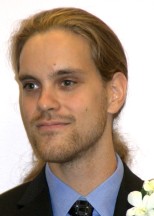MAT 320: Introduction to Analysis
Stony Brook University - Fall 2016
About the course
Prerequisites
- C or higher in MAT 200 or permission of instructor;
- C or higher in one of the following: MAT 203, 205, 211, 307, AMS 261, or A- or higher in MAT 127, 132, 142, or AMS 161
Lectures time and location
Lecturer
 Oleg Viro
Oleg ViroProfessor, Ph.D. 1974, Doctor Phys-Mat.Sci. 1983, both from Leningrad State University
Arrived at Stony Brook in 2007.
Office: Math Tower 5-110
Phone: (631) 632-8286
Email: oleg.viro AT math.stonybrook.edu
Web page: www.math.stonybrook.edu/~oleg
Research fields: Topology and Geometry,
especially low-dimensional topology
and real algebraic geometry.
Office hours
Tuesdays 11:30am - 12:30pm in Math Tower P-143.
Teaching Assistant
 Jean-Francois Arbour, PhD Student
Jean-Francois Arbour, PhD StudentArrived at Stony Brook in 2015
Office: Math Tower 2-122
Email: jean-francois.arbour AT stonybrook.edu
Homeworks
Exams
Grading policy
Textbook
Program of the course
Sequences. limit of a sequence. Limit laws for sequences and formal proofs. Monotone and Cauchy sequences. Subsequences. Bolzano-Weierstrass Theorem, lim inf and lim sup
Topological and metric spaces. Axioms in terms of neighborhoods and open sets and their equivalence. Interior, exterior and boundary points of a set in a topological space. Metric and metric spaces. Balls and spheres in a metric space. Metric topology. Topology of a subspace.
Continuous maps. Definition of continuous maps between topological spaces and their simplest properties. Continuity at a point and its relation to continuity. Sequential continuity and its relation to Continuity. Theorems about operations with continuous functions. Theorem on sequential continuity of composition of sequentually continuous maps.
Extreme Value Theorem. Sequential compactness. Sequentially compact sets in a metric space are bounded and closed. The converse statement for subsets of Euclidean space. Continuous image of a sequentially compact space is sequentually compact.
Intermediate Value Theorem Connected spaces. Properties of connected sets. Connected components of a topological space. Theorem about continuous image of a connected space. Theorems about continuity of monotone functions.
Uniform continuity. Uniform continuity of a continuous function on a closed interval.
Series Convergence and divergence of series, the sum. Geometric series. Cauchy criterion for convergence of series. Tests for convergence of series. Comparison test. Absolute convergence. Ratio and root tests. Harmonic series and its divergence. Convergence of $\sum\frac1{n^p}$. Integral tests. Alternating series theorem. The Riemann rearrangement theorem about conditionally convergent series. Invariance of the sum of a positive convergent series under permutations of its terms.
Power series. Convergence radius of a power series Uniform convergence of a sequence of functions. Continuity of the uniform limit of a sequence of continuous functions. Continuity of power series. Theorem about limit of integrals and integral of the limit
Derivatives Definitions of derivative. Continuity of a differentiable function. Rules for calculation of derivatives. Vanishing of the derivative at a local extremum of a differentiable function, Rolle's theorem and Mean Value Theorem. Values of the derivative and behavior of the function.
Integrals The Darboux integral of a bounded function. The test for integrability. Integrability of monotonic and continuous functions. Properties of Darboux integrals, Intermediate Value theorem for integrals. Fundamental theorem of Calculus. Integration by parts and theorem on change of variable. Term-wise differentiation and integration of power series. Taylor series for a function.